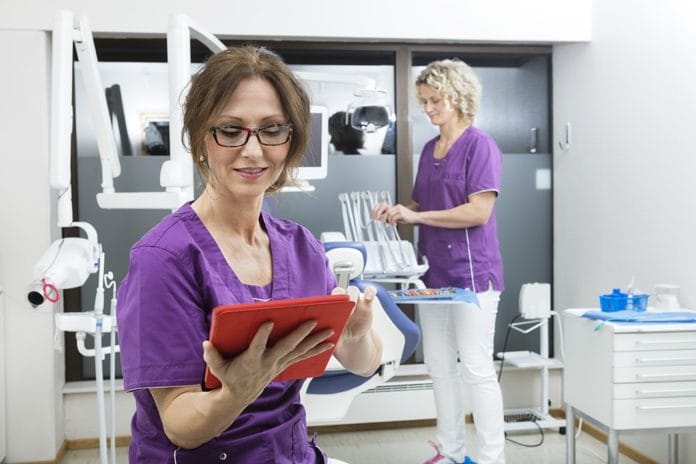I feel I need to begin this article with a vent. Allow me to share a recent experience to demonstrate how office behavior can be perceived from a patient’s point of view. I recently went to a doctor’s office for a yearly checkup. When I approached the desk to sign in, there was no one there to greet me. I waited for 10 minutes before someone came to the desk. After the front office personnel returned to the desk, she asked me to update some paper work.
While I was working on the paperwork, the front office personnel began a loud conversation about American Idol. She asked a co-worker if she had seen the most recent episode. She proceeded to pull up YouTube on the work computer to show the artist she was talking about. She then could not remember another artist name, so she called her teenage daughter to ask her on speakerphone. Then she pulled up an additional video on the work computer. The front office personnel then proceeded to knock over her drink on the desk and loudly cuss several times as she was cleaning it up. I could not believe my ears.
I was relieved to be called back for my appointment to escape for a little peace and quiet. However, as my appointment progressed, I heard the office personnel several more times laughing very loud. The doctor actually rolled his eyes when he heard her laughing!
I tell this story to give an example of how NOT to act as front office personnel, assistant, or dental hygienist. It is very important to be able to have fun, be comfortable, and enjoy your job, yet I believe this experience was very unprofessional.
Merriam-Webster defines professionalism as, “The conduct, aims, or qualities that characterize or mark a professional person.” Appearance, demeanor, reliability, competence, ethics, maintaining poise, phone etiquette, written correspondence, organizational skills, and accountability are 10 points of reference to improve professionalism in your dental office.
Office Appearance
The appearance of the office is the first point of professionalism. When you walk into an office, you want to see it clean and orderly. Check the building and lobby before opening the office to patients; during the day, be observant of your surroundings, and make sure every room is clean and presentable. Don’t forget to check the bathrooms regularly throughout the day. Many consultants will advise the owners or doctors to repaint or remodel every 7 to 10 years.
Your Appearance
Your appearance is very important as well. You are a dental PROFESSIONAL. Brush and floss your teeth regularly through the day. Keep your hair away from your face if you are female, and nicely trimmed if you are male. Scrubs should be neat and not wrinkled. Wear your makeup light and natural, no fake fingernails or nail polish. You need to be able to see under your nails to clean your hands properly. Do not chew gum while seeing or talking to patients.
Demeanor
Demeanor is your behavior towards other people. We all have bad days, leave it at the door. Don’t take your bad days out on co-workers and or patients. Smile and give sincere compliments to the people you interact with throughout the day.
Reliability
Reliability is the quality of being trustworthy or of performing consistently well. Performing consistently well is important in our line of work. Being reliable keeps you employable. Show up on time or 10 minutes early. Stay on schedule as much as possible. Communicate with the front office when you are not on time.
Competence
Competence is the ability to do something successfully or efficiently. If you are having trouble with radiographs, take a course to improve your skills. We as dental professionals should always be finding ways to improve our skills and knowledge base. Even after 23 years in dentistry, I still try to take more continuing education courses than the minimum required to maintain my license. Be a lifelong learner. Our field is ever evolving and to stay competent, we must stay current.
Ethics
Ethics are the moral principles that govern a person’s behavior or the conducting of an activity. These principles include dignity, honesty, and loyalty. For example, my employers and co-workers will be the first to tell you that I tattle on myself very quickly. The other day, I broke a light socket cover, I quickly confessed and offered to pay for it. This is a minor situation, but if you are trustworthy with the small stuff, then people will trust you with the big stuff.
Poise
Poise is defined as graceful and elegant bearing in a person. Maintaining poise in all situations is vital for dealing with co-workers, bosses, and patients. Recently, I was filling in at an office, when the office manager approached me and warned me that my next patient was not happy about seeing a new hygienist. As I called the patient back to the operatory, he let me know we had ruined his day.
He continued to complain into the room. He asked me if this was my first day, I told him yes, at this particular office, but that I had 23 years of experience in dentistry. He slowly calmed down and let me treat him. As I worked, I asked him several questions about his past experiences. He stated that he had experiences in the past where he felt his teeth were not cleaned properly.
Once he calmed and let me start working, we found out we had a common friend and got to talk about our common military days. Staying calm and trying to get to the bottom of his “bad mood” helped me connect with this patient. After he checked out, the office manager came in and complimented me on how well I handled this patient.
Phone Etiquette
Many times the first impression in your office is over the phone. Generally speaking, phone etiquette is not something the assistants and the hygienist have to work with regularly. However, we do need proper phone etiquette techniques and or scripts for when we are called to help at the front desk.
Personal Phone Use
Personal cell phone use in the office should be kept to a minimum. Cell phones should not be outside of the employee lounge area and should be kept on silent. Let your employer know if you need to keep the cell phone on you for any reason.
Written Correspondence
Written correspondence is very important communication tool. Proper grammar and correct spelling are necessary to maintain a professional and legal document. The documents you fill out on a daily basis are legal documents. Double-check all of your written correspondence including your chart notes.
Organizational Skills
Organizational skills are important to be able to find all your supplies. Organize each room universally so everyone can find supplies, as they need them in each room. When helping in the front office, follow organizational techniques created by the front office personnel.
Accountability
Accountability is defined as the fact or condition of being accountable and responsible. Being responsible is being an adult. Show up to work on time. Call in as quickly as you know you might be late, out sick, or out for a family emergency. This allows the office manager or the doctors to fill your position or change the schedule for the day.
The patient’s perception of the office is very important. I notice more in different offices because I work in a dental office. These are some questions I think about when I enter a Doctor’s office. Would I want to be treated in this office? Is it clean? Is it professional? Is the staff friendly?
What can you do as a Dental PROFESSIONAL to improve these areas?











